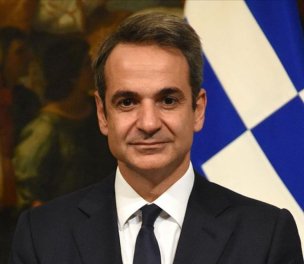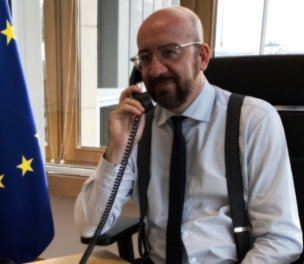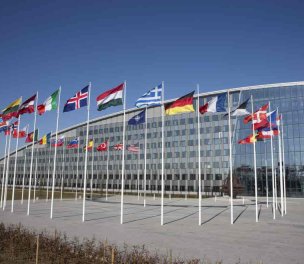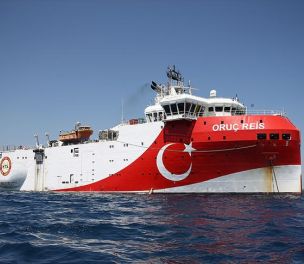* Photos: AA/Wikipedia
Click to read the article in Turkish
As reported by the Greece-based Proto Thema news website, Prime Minister of Greece Kyriakos Mitsotakis will travel to the Mediterranean island of Corsica in France tomorrow (September 10) upon the invitation of President of France Emanuel Macron.
Referring to Proto Thema, Greek City Times has noted, "The French leader seems to aspire to play a leading role in European affairs and has become Greece's warmest ally, while also being one of the toughest critics of Turkish President Recep Tayyip Erdoğan."
According to government sources in Greece, Mitsotakis will have a private meeting with Macron, during which they will discuss the broader framework of Greek-French cooperation. It is also considered highly likely that the agreement on the sale of French weapons, namely Rafale aircraft and more, will be finalized in the conversation between the two leaders.
Which countries will participate?
To be hosted by France in Corsica, the unofficial meeting will be attended by the leaders of France, Greece, Southern Cyprus, Malta, Italy, Spain and Portugal. The main issues on the agenda of the meeting are expected to be the Eastern Mediterranean crisis, the latest developments in Libya and the refugees heading from Europe through the Mediterranean.
'Turkey is ready for sincere talks with Greece'
On the other side, Ümit Yalçın, the Ambassador of Turkey, has addressed a letter to the UK-based The Guardian newspaper. Titled "Turkey is ready for sincere talks with Greece," the letter briefly reads:
"Your editorial (6 September) suggests that the UN convention on the law of the sea supports both Greece and the status quo. That is not entirely accurate, as the same convention also refers to the principle of equity.
"Turkey has been inviting relevant parties to engage in negotiations based on international law and the principle of equity since 2003 for the delimitation of exclusive economic zones. Yet the Greek side has never engaged in sincere dialogue, in order to delay and avoid concrete negotiations.
"The latest attempts by Germany to bring about the resumption of talks were sabotaged by Greece twice – first by signing an agreement on the issue with Egypt, then refusing to talk to Turkey. Similarly, the recent efforts exerted by the Nato secretary general for initiating technical talks on deconfliction measures were again rejected by Greece.
"Turkey, on the other hand, supported these initiatives and is ready to engage in sincere talks."
NATO meeting postponed
NATO Secretary General Jens Stoltenberg made a statement on September 3 and announced that Turkey and Greece would start technical talks to reduce the risks of incidents in the Eastern Mediterranean.
However, citing sources from Turkey's Ministry of National Defense, the state-run Anadolu Agency (AA) reported yesterday (September 8) that the meeting between military delegations from Turkey and Greece was rescheduled for tomorrow (September 10).
The meeting to be held at the NATO headquarters in Brussels, the capital city of Belgium, was initially planned for September 8.
According to ministry sources, the "technical talks," which were planned after a meeting between President Recep Tayyip Erdoğan and NATO Secretary-General Jens Stoltenberg, are postponed by the NATO Military Committee.
Timeline of the Eastern Mediterranean crisisThe tension between Turkey and Greece over their right to explore energy resources in the Eastern Mediterranean has seriously escalated over the last months. The latest developments leading to this escalation are briefly as follows: On July 21, Turkey issued its first Navtex alert for Oruç Reis seismic vessel's exploration activities in the Eastern Mediterranean. On July 28, Turkey announced after Germany's diplomatic efforts that it suspended hydrocarbon exploration activities and stated that it was ready to talk with Greece. On August 6, Greece and Egypt signed a maritime border agreement. On August 10, Turkey announced that its drillship Oruç Reis would resume energy exploration in the Eastern Mediterranean. It said the ship will continue its work along with the ships Cengiz Han and Ataman until August 23. On August 14, the EU foreign miniters discussed the crisis at an extraordinary meeting, calling on Turkey to end hydrocarbon exploration activities in contested waters. On August 16, Turkey issued a Navtex, announcing that its drill ship Yavuz will continue its work exploring for energy resources off the island of Cyprus. On August 23, Turkey issued another Navtex, stating that the Oruç Reis vessel would continue its activities until August 27. On August 24, Greece held joint naval drills with the US in the south of Crete island. One day later, Turkey conducted naval exercises with Italy. On August 25, Germany's Minister of Foreign Affairs Heiko Maas visited Athens and Ankara to encourage the two countires to have direct talks. On the same day, Turkey held replenishment exercises with Italy in the Eastern Mediterranean. On August 26, US President Donald Trump had phone talks with President Recep Tayyip Erdoğan and Prime Minister of Greece Kyriakos Mitsotakis, urging them to reduce tensions and start dialogue. On the same day, Turkey and the US conducted joint maritime exercises. On August 27 and 28, EU foreign ministers met with the Eastern Mediterranean crisis on the top of their agenda. The Union's foreign polict head Josep Borrell said after the meeting that Turkey's ships might be sanctioned if they continued hydrocarbon activities. Turkey's Ministry of National Defense on August 28 announced that it intercepted six F-16 fighters planes of Greece, which it said were closing in on the area where Turkey issued a Navtex. On September 1, the US lifted the arms embargo on Southern Cyprus. On September 2, Turkey issued two Navtex alerts for Russia's gunnery exercises in the Eastern Mediterranean. It was stated that Russia would conduct exercises in two different areas that correspond to Turkey's hydrocarbon exploration activities on the east and west of the Cyprus island. On September 3, NATO Secretary General Jens Stoltenberg said, "Following my discussions with Greek and Turkish leaders, the two Allies have agreed to enter into technical talks at NATO to establish mechanisms for military deconfliction to reduce the risk of incidents and accidents." On September 4, Prime Minister of Greece Kyriakos Mitsotakis said that Greece would only enter into a dialogue with Turkey if it "stops provocation" in the Eastern Mediterranean. Shortly before this statement, Turkey's Foreign Ministry stated, "Turkey is ready to enter into dialogue with Greece without any preconditions, in order to find lasting, fair and equitable solutions to all outstanding issues between Turkey and Greece." On September 8, the state-run Anadolu Agency (AA) reported that the meeting between military delegations from Turkey and Greece was rescheduled for September 10. |
(PT/SD)




.jpg)




sa.jpg)
as.jpg)
